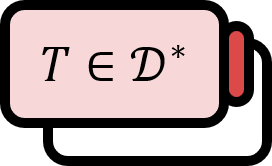Distributional Convolution Convergence Theorem
Theorem1
Let’s say $\phi$ is a test function that satisfies $\int_{\mathbb{R}^{n}}\phi (\mathbf{x})d\mathbf{x}=1$. And let $\phi_{\epsilon}(\mathbf{x})=\epsilon^{-n}\phi (\epsilon^{-1}\mathbf{x})$ be given. Then, for any distribution $F$ and regular distribution $T_{F*\phi_{\epsilon}}$, when $\epsilon \to 0$, $T_{F*\phi_{\epsilon}}$ converges to $F$.
$$ T_{F * \phi_{\epsilon}} \overset{\text{w}}{\to} F\quad \text{as } \epsilon \to 0 $$
Description
The name ‘The Convolution Convergence Theorem for Distributions’ is arbitrarily given as there was no specific name attached to the content above.
Proof
Let $\tilde{\phi}(x)=\phi (-x)$ be given. Then, similarly to $\phi$, $\tilde{\phi}$ will also be $\int \tilde{\phi}=1$. Therefore, according to the Convolution Convergence Theorem, for any test function $\psi$, the following formula holds.
$$ \tilde{\phi}_{\epsilon} \ast \psi \overset{\text{unif}}{\to} \psi \quad \text{and} \quad \partial ^{\alpha} (\tilde{\phi}_{\epsilon} \ast \psi)=\tilde{\phi}_{\epsilon} \ast \partial^{\alpha}\psi \overset{\text{unif}}{\to} \partial^{\alpha}\psi $$
Then, the following formula is established.
$$ \begin{align*} \lim \limits_{\epsilon \to 0} T_{F \ast \phi_{\epsilon}}(\psi) &= \lim \limits_{\epsilon \to 0}F(\tilde{\phi}_{\epsilon} \ast \psi) \\ &= F(\psi) \end{align*} $$
The first equality is due to the Auxiliary Theorem of Convolution for Distributions. The second equality is based on the Continuity Condition of Distributions. Thus, according to the definition of Convergence of Distributions, $T_{F*\phi_{\epsilon}}$ converges to $F$.
■
Gerald B. Folland, Fourier Analysis and Its Applications (1992), p318 ↩︎
